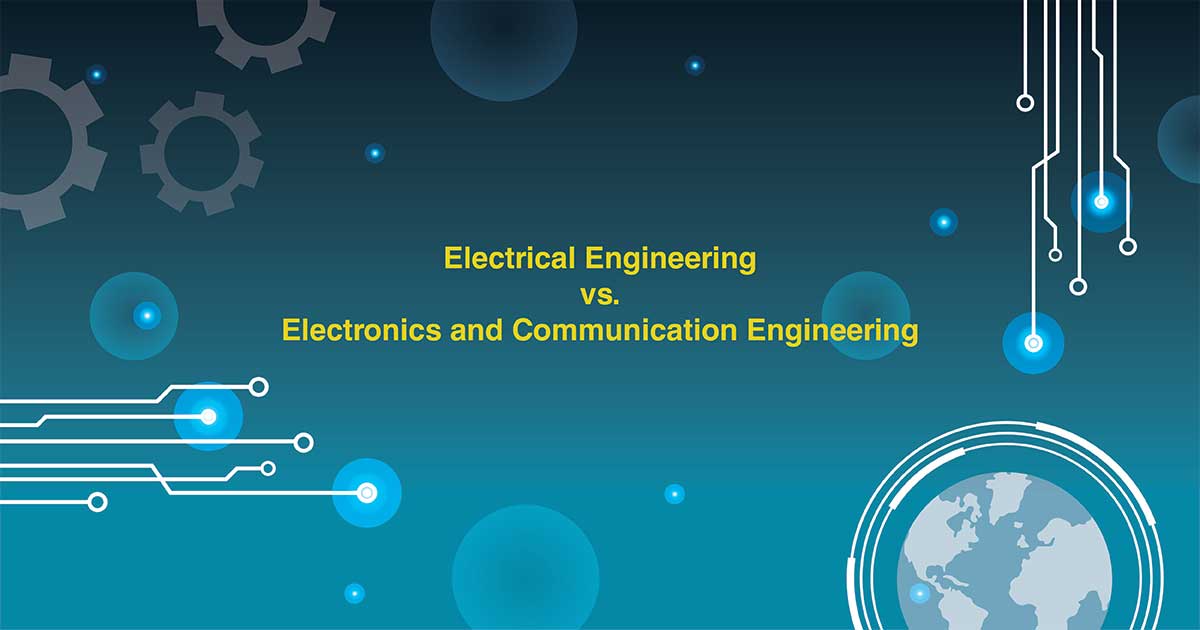FET Blogs


FET Blogs



01 April 2024
Table of Contents:
Electrical engineering and Electronics and Communication engineering are closely related disciplines in the vast engineering field. The study, design and use of equipment and appliances that use any form of electricity comes under electrical engineering. In contrast, electronics and communication engineering focuses more on information transmission across different mediums via electronic devices. If you are passionate about developing and applying capacitors, inductors, inverters or other home appliances, electrical engineering is the right choice. On the other hand, if telecommunications, sensors, and microprocessors excite you, then electronics and communication engineering is the path ahead.
Both fields offer promising career opportunities, and the decision should be based on personal passion and the specific area of interest within the vast engineering field. As technology continues to evolve, professionals with a blend of skills from both disciplines may find themselves at an advantage in the ever-changing engineering landscape.
The course duration of these two fields of engineering is similar. To complete an electrical engineering degree, you need four years. It is considered a broader subject and can acquaint you with basic knowledge of electronics and communication as well, along with a wide range of topics related to electrical systems, devices, and networks.
Electronics and communication engineering takes four years to complete as well. It is a specific course designed to equip you with specialised skills relevant to modern communication technologies. The duration is tailored to emphasise electronics, signal processing, and communication systems.
The electrical engineering curriculum encompasses various topics, giving students a holistic understanding of electrical systems. Electrical engineering refers to electricity transmission and the proper and smooth production, functioning and storage of electricity when it travels from point A to point B. Some of the subjects that are taught in this field are:
While many students tend to get confused between the two subjects, electronics and communication deals with the electronics part that covers devices and chips used in electricity transmission. It focuses on the application of electronics to communication systems. The subjects that are dealt with while pursuing electrical and communication engineering are:
Electrical engineers have the necessary knowledge of mathematics and physics and technological know-how for debugging and scrutinising situations from a technical perspective. Some of the career opportunities that are available for an electrical engineer are:
With the continuous development in communication technology and our increasing reliance on electronic systems, graduates with an electronics and communication engineering degree can work in telecommunication, aviation, research and development, automotive, defence and many other industries. Here are a few career opportunities that are available in this discipline:
Electrical engineering and electronics and communication engineering are disciplines that stand out independently and are considered some of the most dynamic and promising engineering fields. The choice between the two is purely out of one’s personal interests and future career goals. Although both fields have substantial overlap, the learning outcomes from these degrees are substantially different, including the particular applications they cater to in the engineering domain. Let your long-term career aspiration and aptitude shape and guide your decision!
A1: TVs are electronic devices, relying on circuits and digital technology.
A2: Electronic engineering focuses on circuits, while electrical covers power; choice depends on interest.
A3: BTech electronics graduates in India earn 4-8 lakhs per annum initially.
A4: Yes, EEE involves coding for automation and control systems.
A5: ECE has strong future prospects in telecom, IoT, and AI integration.
A6: AI will enhance, not replace, electrical engineers by automating routine tasks.
Popular Post
17 February 2026
AIE Full Form
10 February 2026
AEIE Full Form
22 January 2026
AE Full Form
16 January 2026
What is Aerospace Engineering?
16 January 2026
What is Chemical Engineering?
Ask an Expert for Free